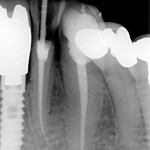
Vishal Aggarwal considers the findings of a recent qualitative study, which looks at the contextual factors, barriers, and facilitators to accessing oral health interventions for people with severe mental illness.
[read the full story...]
Vishal Aggarwal considers the findings of a recent qualitative study, which looks at the contextual factors, barriers, and facilitators to accessing oral health interventions for people with severe mental illness.
[read the full story...]
This review of the efficacy of oxycodone for post-operative acute dental pain included 13 studies. the findings showed that NSAIDs are generally superior for post-surgical dental pain, with a better adverse effect profile,so the need for oxycodone in dentistry is limited.
[read the full story...]
In her debut blog, Jodie Ferris summarises a recent cohort study on the temporal relationship between severe mental illness diagnosis and chronic physical comorbidity in the UK, which contains important findings for care and future research.
[read the full story...]
Jess Williams examines a nationally representative population-based study on suicidality among sexual minority and transgender adolescents in Canada.
[read the full story...]
This review of apical surgery compared with non-surgical root canal treatment or retreatment for teeth with apical periodontitis included 5 studies.None of the included studies were at low risk of bias so the findings should be viewed very cautiously.
[read the full story...]
In his debut blog, Kris Deering summarises a paper which looks at the evidence gaps and research priorities for early intervention in psychosis.
[read the full story...]
This well conducted randomised controlled trial assessed inferior alveolar nerve block (IANB) success of 2% mepivacaine and 4% articaine in patients with symptomatic irreversible pulpitis (SIP) in mandibular molars during access cavity preparation and instrumentation.
[read the full story...]
Millie Lowther, Isabel Luetkenherm, Carlos Mena and Alexandra Pike summarise a recent fMRI meta-analysis, which finds that activation in brain circuits related to salience, interoception and emotional processing were found to predict a positive response to CBT in anxiety disorders.
[read the full story...]
Sarah Carr reflects on a recent US study that “perhaps tells us something deeper about the discrimination and stigmatisation in mental health that needs to be tackled.”
[read the full story...]
This review assess of listening to music to reduce preoperative anxiety and pain during third molar extractions included 5 RCTs. The findings suggest reducction in preoperative anxiety but the quality and number of studies is limited.
[read the full story...]